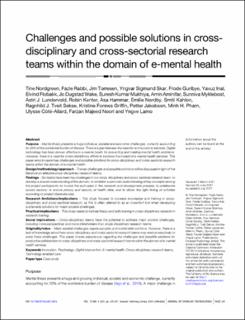Challenges and possible solutions in cross-disciplinary and cross-sectorial research teams within the domain of e-mental health
Nordgreen, Tine; Rabbi, Fazle; Tørresen, Jim; Skar, Yngvar Sigmund; Guribye, Frode; Inal, Yavuz; Flobak, Eivind; Wake, Jo Dugstad; Mukhiya, Suresh Kumar; Aminifar, Amin; Myklebost, Sunniva Brurok; Lundervold, Astri J.; Kenter, Robin Maria Francisca; Hammar, Åsa Karin; Kahlon, Smiti; Nordby, Emilie; Sekse, Ragnhild Johanne Tveit; Griffin, Kristine Fonnes; Jakobsen, Petter; Pham, Hoang Minh; Côté-Allard, Ulysse Teller Masao; Noori, Farzan Majeed; Lamo, Yngve
Peer reviewed, Journal article
Published version
Permanent lenke
https://hdl.handle.net/11250/2832706Utgivelsesdato
2021Metadata
Vis full innførselSamlinger
Originalversjon
Journal of Enabling Technologies (JET). 2021, 15 (4), 241-251. 10.1108/JET-03-2021-0013Sammendrag
Purpose
Mental illness presents a huge individual, societal and economic challenges, currently accounting for 20% of the worldwide burden of disease. There is a gap between the need for and access to services. Digital technology has been proven effective in e-mental health for preventing and treating mental health problems. However, there is a need for cross-disciplinary efforts to increase the impact of e-mental health services. This paper aims to report key challenges and possible solutions for cross-disciplinary and cross-sectorial research teams within the domain of e-mental health.
Design/methodology/approach
The key challenges and possible solutions will be discussed in light of the literature on effective cross-disciplinary research teams.
Findings
Six topics have been key challenges in our cross-disciplinary and cross-sectorial research team: to develop a shared understanding of the domain; to establish a common understanding of key concepts among the project participants; to involve the end-users in the research and development process; to collaborate across sectors; to ensure privacy and security of health data; and to obtain the right timing of activities according to project dependencies.
Research limitations/implications
This study focuses to increase knowledge and training in cross-disciplinary and cross-sectorial research, as this is often referred to as an important tool when developing sustainable solutions for major societal challenges.
Practical implications
This study needs to include theory and skills training in cross-disciplinary research in research training.
Social implications
Cross-disciplinary teams have the potential to address major societal challenges, including more perspectives and more stakeholders than single disciplinary research teams.
Originality/value
Major societal challenges require complex and sustainable solutions. However, there is a lack of knowledge about how cross-disciplinary and cross-sectorial research teams may work productively to solve these challenges. This paper shares experiences regarding the challenges and possible solutions for productive collaboration in cross-disciplinary and cross-sectorial research teams within the domain of e-mental health services.

